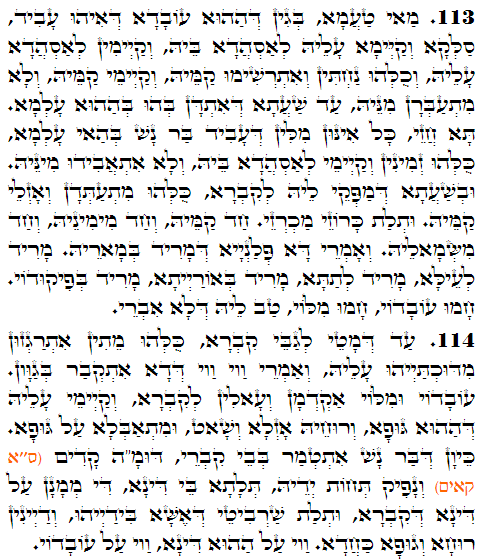Daily Zohar # 3360 – Naso – What happens after the soul leaves the body
.
Hebrew translation:
114. עַד שֶׁמַּגִּיעַ לַקֶּבֶר, כָּל הַמֵּתִים רוֹגְזִים עָלָיו מִמְּקוֹמָם וְאוֹמְרִים: אוֹי אוֹי שֶׁזֶּה נִקְבָּר בְּתוֹכֵנוּ! מַעֲשָׂיו וּדְבָרָיו מַקְדִּימִים וְנִכְנָסִים לַקֶּבֶר, וְעוֹמְדִים עַל אוֹתוֹ גּוּף, וְרוּחוֹ הוֹלֶכֶת וְשָׁטָה וּמִתְאַבֶּלֶת עַל הַגּוּף. כֵּיוָן שֶׁהָאָדָם נִטְמָן בְּבֵית הַקְּבָרוֹת, דּוּמָ”ה מַקְדִּים וְיוֹצֵא תַּחַת יָדָיו שְׁלֹשָׁה בָּתֵּי דִינִים שֶׁמְּמֻנִּים עַל דִּין הַקֶּבֶר, וּשְׁלֹשָׁה שַׁרְבִיטֵי אֵשׁ בִּידֵיהֶם, וְדָנִים רוּחַ וָנֶפֶשׁ כְּאֶחָד. אוֹי עַל אוֹתוֹ הַדִּין! אוֹי עַל מַעֲשָׂיו!
.
Zohar Naso
Continued from previous DZ
#113
Everything a person did during his life is registered above and at the time of his death they come down and testify on him. He must admit to them because he is shown exactly what he did. None of his actions is forgotten or lost.
And when they take him out to the grave, his actions walk in front of him. And three announcers; One in front of him, and one on his right, and one on his left, saying: This is a man who rebelled against his master; rebelled against heavens, rebelled below, rebelled against the Torah, rebelled against the commandments. Look at his actions! See his words! It would have been better if he wasn’t born.
#114
By the time he reaches the grave, all the dead are annoyed by him and say: Woe to us that this is buried among us! His actions and words advance and enter the grave, and stand on his body, and his soul goes astray and mourns the body. Because the man is buried in the cemetery, the angel Duma brings forth three tribunals that are appointed to the judgment that is executed in the grave, and three batons of fire in their hands, inflicting the judgment on the Nefesh and Ruach of that person as one. Woe on this judgment and woe on his actions!
Lesson;
Our brain is not like a computer memory that requires a certain physical location to store its data. Anything we experience in life, actions, words, and emotions are retained in our memory. We may not remember a certain event for many years but someday it may come out. Our memory is not in our physical brain but it’s on a spiritual level. Different ‘triggers’ can bring to ‘life’ detailed events with the emotions we experienced at that time. It can be vivid and ‘burning’ in our hearts and minds.
Upon death, the soul loses the limitations of the body and all its ‘memories’ are revealed. This is what the Zohar explains above as all actions come down and testify. The soul mourns the loss of the body and experiences a terrible pain of regrets on all the opportunities the soul could have done while in the body and didn’t. The angels with batons of fire remove the desire of the soul to stay in the body. Only righteous people that didn’t enjoy the pleasures of this world avoid this very painful process. People who died after midday Friday skip this process because the holiness of Shabbat is revealed in the world.
We forgot many of our sins and negative actions. We can start correcting our past sins by doing more positive actions, especially connecting to the sacred text of Zohar and Tehillim that reveal great light in the world. Giving Tzedakah is a powerful action to cleanse past wrongs because Tzedakah transforms physical to Light. We can meditate that the merit of our Tzedakah would apply to cleanse wrong actions and words made in the past.
Divide the monthly tithe to smaller amounts and give every week with the meditation above. It is a strong spiritual tool for cleansing and success. We can dedicate almost any positive action toward cleansing past inequities and or adding merits for soul elevation after the soul leaves the body.
We’ll continue with this subject in the following studies of Zohar Naso.
{||}

 Previous: Naso
Previous: Naso

